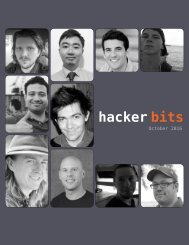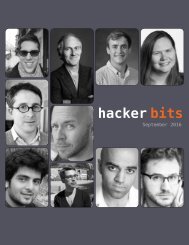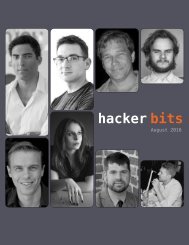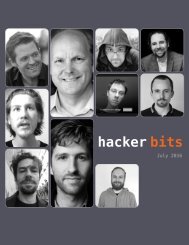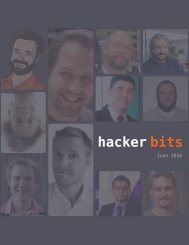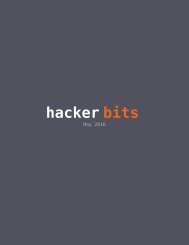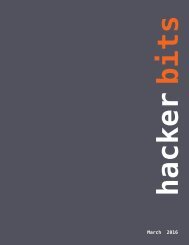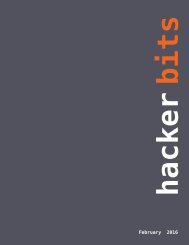Hacker Bits, April 2016
HACKER BITS is the monthly magazine that gives you the hottest technology and startup stories crowdsources by the readers of Hacker News. We select from the top voted stories for you and publish them in an easy-to-read magazine format. Get HACKER BITS delivered to your inbox every month! For more, visit http://hackerbits.com.
HACKER BITS is the monthly magazine that gives you the hottest technology and startup stories crowdsources by the readers of Hacker News. We select from the top voted stories for you and publish them in an easy-to-read magazine format.
Get HACKER BITS delivered to your inbox every month! For more, visit http://hackerbits.com.
You also want an ePaper? Increase the reach of your titles
YUMPU automatically turns print PDFs into web optimized ePapers that Google loves.
About 50% of the Triplebyte candidates<br />
who fail interviews at companies<br />
fail for non-technical reasons.<br />
1. Be enthusiastic<br />
Enthusiasm has a huge impact<br />
on interview results. About 50%<br />
of the Triplebyte candidates<br />
who fail interviews at companies<br />
fail for non-technical reasons.<br />
This is usually described by the<br />
company as a “poor culture fit”.<br />
Nine times out of ten, however,<br />
culture fit just means enthusiasm<br />
for what a company does.<br />
Companies want candidates who<br />
are excited about their mission.<br />
This carries as much weight at<br />
many companies as technical<br />
skill. This makes sense. Excited<br />
employees will be happier and<br />
work harder.<br />
The problem is that this<br />
can be faked. Some candidates<br />
manage to convince every<br />
company they talk to that it’s<br />
their dream job, while others<br />
(who are genuinely excited) fail<br />
to convince anyone. We’ve seen<br />
this again and again. The solution<br />
is for everyone to get better<br />
at showing their enthusiasm.<br />
This is not permission to lie. But<br />
interviewing is like dating. No<br />
one wants to be told on a first<br />
date that they are one option<br />
among many, even though this<br />
is usually the case. Similarly,<br />
most programmers just want a<br />
good job with a good paycheck.<br />
But stating this in an interview<br />
is a mistake. The best approach<br />
is to prepare notes before an<br />
interview about what you find<br />
exciting about the company, and<br />
bring this up with each interviewer<br />
when they ask if you have<br />
any questions. A good source of<br />
ideas is to read the company’s<br />
recent blog posts and press<br />
releases, and note the ones you<br />
find exciting.<br />
This idea seems facile. I<br />
imagine you are nodding along<br />
as you read this. But (as anyone<br />
who has ever interviewed can<br />
tell you) a surprisingly small<br />
percentage of applicants do this.<br />
Carefully preparing notes on<br />
why you find a company exciting<br />
really will increase your pass<br />
rate. You can even reference<br />
the notes during the interview.<br />
Bringing prepared notes shows<br />
preparation.<br />
2. Study common<br />
interview concepts<br />
A large percentage of interview<br />
questions feature data structures<br />
and algorithms. For better<br />
or worse, this is the truth. We<br />
gather question details from<br />
our candidates who interview at<br />
YC companies (we’ll be doing<br />
an in-depth analysis of this<br />
data in a future article), and<br />
algorithm questions make up<br />
over 70% of the questions that<br />
are asked. You do not need to<br />
be an expert, but knowing the<br />
following list of algorithms and<br />
data structures will help at most<br />
companies.<br />
• Hash tables<br />
• Linked lists<br />
• Breadth-first search, depthfirst<br />
search<br />
• Quicksort, merge sort<br />
• Binary search<br />
• 2D arrays<br />
• Dynamic arrays<br />
• Binary search trees<br />
• Dynamic programming<br />
• Big-O analysis<br />
Depending on your background,<br />
this list may look trivial,<br />
or may look totally intimidating.<br />
That’s exactly the point. These<br />
are concepts that are far more<br />
common in interviews than they<br />
are in production web programming.<br />
If you’re self-taught or<br />
years out of school and these<br />
concepts are not familiar to you,<br />
you will do better in interviews if<br />
you study them. Even if you do<br />
know these things, refreshing<br />
your knowledge will help.<br />
A startlingly high percentage<br />
of interview questions reduce to<br />
breadth-first search or the use<br />
of a hash table to count uniques.<br />
You need to be able to write<br />
a BFS cold, and you need to<br />
understand how a hash table is<br />
implemented.<br />
Learning these things is not<br />
hacker bits<br />
13








